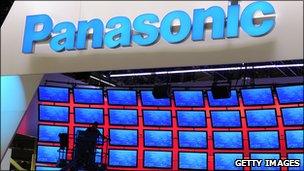Panasonic reports record annual loss
- Published

Demand for big plasma television screens has been falling
Japanese electronics giant Panasonic has reported a record annual loss after demand for plasma TV screens fell and a series of natural disasters hit output.
It reported a net loss of 772.2bn yen ($9.7bn; £6.0bn) for the year to March, with sales down 10% to 7.85tn yen.
The company has also been hit by competition from rival TV makers and affected by the strong yen.
But Panasonic has predicted that it will bounce back into profit in the current year, helped by cost-cutting.
It says that a restructuring programme initiated in January will help it report a profit of 50bn yen, with sales expected to grow by 3% to 8.1 trillion yen.
However, sales of its flat-screen TVs are expected to fall to 15.5 million units this year, from 17.5 million in the previous 12 months.
The past year has seen Panasonic's business affected by electricity shortages caused by the fallout from the Japanese tsunami, and supply chain disruption caused by flooding in Thailand.
Deteriorating conditions inside Japan and the European economic crisis also reduced sales.
Strong currency
The strength of the yen has also caused problems for Japanese exporters, as it makes their goods more expensive to foreign buyers and cuts the earnings of firms when they repatriate their foreign earnings.
In the first three months of 2012, Panasonic's losses increased 10-fold to 438bn yen, with sales down 8% to 1.88tn yen.
Rival Sony has reported a record annual loss of 456.7 billion yen ($5.7bn; £3.5bn), but has also forecasted that it will return to profit this year, taking a similar route to cutting costs by restructuring.
Japan's consumer electronics market is under longer-term pressure from the decline in demand for plasma TVs as digital television is rolled out across the world. Japanese manufacturers are losing market share to their South Korean rivals.
Sales at AVC Networks, Panasonic's line of digital TVs and related products, saw sales decline by 21% to 1.7 billion yen because of declining demand for its flat-panel TVs.
It suffered from the tsunami more than rivals such as Sony or Toshiba because, according to technology analysts IHS iSuppli, it is the only one of that group that still manufactures most of its LCD TVs in Japan.
- Published11 May 2012
- Published10 May 2012